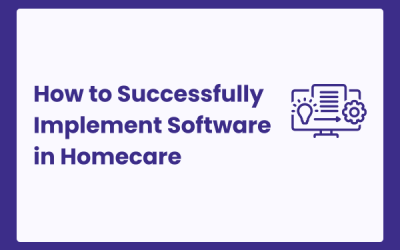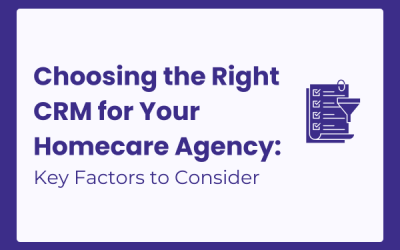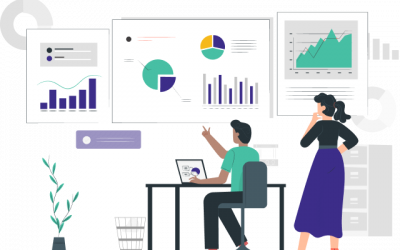According to Nucleus Research, the average ROI for CRM investment as of August 2023 is $3.10 for every dollar spent.
Adopting a homecare CRM system will snowball your homecare agency’s operational efficiencies while increasing patient referrals and caregiver applicants, reducing time to conversion, and maximizing conversion rates.
What does this mean for homecare agencies, especially those still utilizing legacy systems such as spreadsheets and paper?
A CRM is a dynamic tool for homecare agencies. It empowers agency staff to efficiently manage various aspects of the business, such as patient referrals, caregiver applicants, marketing leads, and workflows. The system consolidates all this information into a centralized database, offering a streamlined approach to data management that reduces errors and increases conversion rates and revenue.
This blog post will explore what a CRM is, why it’s essential for scaling your homecare agency, and the benefits it can bring to your operations.
How Can a CRM Benefit Your Homecare Agency?
A Single Source of Truth
Having a single system to store prospective patient and caregiver details, their requirements, preferences, and communications streamlines operations by reducing reliance on multiple tools and platforms and ensures accessibility for all stakeholders within your agency.
It can also foster collaboration among various departments within your homecare agency by providing a platform for shared progress and coordinated efforts, ensuring a seamless flow of information. For example, your intake and HR departments can collaborate to ensure that patients and caregivers are ready to proceed simultaneously.
Improved Workflow Efficiency
Having consistent workflow processes ensures consistency, timely follow-ups, and accountability.
CRM automation streamlines repetitive tasks, freeing time for quality care delivery and minimizing administrative errors, thus supporting scalability.
Enhanced Patient Experience
As your agency grows, a CRM supports personalized interactions and optimizes service delivery by maintaining a comprehensive view of each patient’s history and individual needs and matching the most suitable caregivers to the patient’s needs and preferences.
Preparedness for Scalability and Growth
While your process might be able to handle your current volume, are they flexible and durable enough to handle higher volumes or significant changes?
Scaling your agency means being able to handle more leads, referrals, and applicants while maintaining consistent processes with comparable resources. Managing leads becomes challenging with growth. A CRM organizes and tracks leads, optimizing conversion processes and efficiently managing potential clients and employees.
Additionally, a CRM’s flexibility allows adaptation to changing industry regulations and technological advancements, thus facilitating efficient scalability.
Efficient Resource Allocation
A CRM is crucial in ensuring efficient resource allocation within an organization. It is instrumental in optimizing and allocating resources—including staff, time, and budget—by meticulously tracking and analyzing resource utilization. This optimization not only supports operational efficiency but also creates capacity for growth.
A CRM provides insight into areas where resources may be over or underutilized, allowing for reallocation to where they can be used more effectively. This strategic approach to resource management, supported by a CRM, can significantly improve productivity and ultimately drive business growth.
Facilitation of Remote Work
A CRM plays a crucial role in enabling remote work and outsourcing. This is achieved through its ability to provide access to vital information from any geographical location. This allows for smooth operation and ensures that the quality of service is not compromised, regardless of where the employees are based.
Consequently, this facilitates the growth and scalability of a homecare agency, allowing it to expand its services without being bound by geographical limitations.
Reporting on KPIs and Data-Driven Decision Making
CRM analytics are essential for scaling a homecare agency. They provide insights for informed decision-making and adaptive strategies based on real-time data. Additionally, leveraging KPIs through a CRM can boost the bottom line by enabling data-driven decisions and strategic financial management.
Here are a few examples of metrics to track to grow your agency:
Conversion Rate: The conversion rate represents the percentage of potential patients who become admitted patients. This is important because it measures the effectiveness of your agency’s efforts in converting leads or inquiries into actual admissions. A higher conversion rate indicates successful marketing strategies, efficient communication, and a positive reputation.
Time to Conversion: A critical metric that measures the speed at which a patient is admitted and receives care after the initial contact. Monitoring this metric helps understand how long it takes for a lead to become a patient. In today’s competitive market, speed is the ultimate differentiator, as patients will go with the agency that can get them services as soon as possible. Also, tracking this metric allows you to set expectations for the process and timeline with new leads.
To learn more about what metrics homecare agencies should be tracking, see our related blog posts on patient intake and caregiver onboarding metrics.
Enhanced Professional Image
You can present a well-organized and patient-focused approach to conducting business by leveraging CRM capabilities. This will make a lasting impression on your patients and caregivers and speak volumes about your commitment to delivering superior service.
The systematic approach enabled by CRM processes can significantly enhance your professional image, making your agency more appealing to prospective patients and caregivers. This, in turn, can lead to increased opportunities and growth.
When Should Your Company Consider Adopting a CRM?
The sooner you adopt a CRM, the better. While operating without one is possible, you will quickly experience the limitations of relying on legacy systems. Bouncing between paper and spreadsheets is cumbersome and time-consuming, slowing your team’s efficiency.
Embracing a CRM is key to overcoming these limitations and mitigating the disadvantages of temporary legacy solutions, significantly affecting revenue and the capacity to grow sustainably.
Conclusion
A CRM is a foundational element of an agency’s infrastructure. It supports your homecare agency’s operations, growth, and scalability.
A CRM is an indispensable tool for navigating the complexities of scaling operations while maintaining the highest standards of patient care. It enhances efficiency, communication, and data-driven decision-making, resulting in better patient outcomes and increased revenue.
Discover how Inflowcare is the homecare CRM solution for your homecare agency to increase patient referrals and qualified caregiver applicants. Request a demo today!


